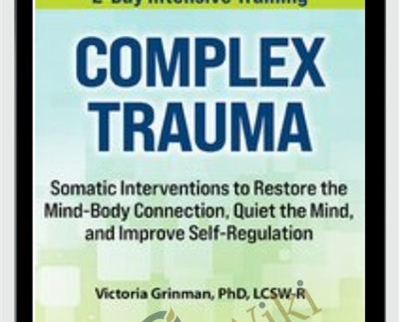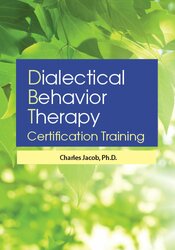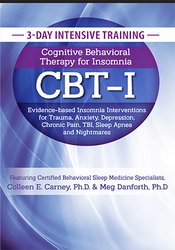2-Day Complex Trauma-Somatic Interventions to Restore the Mind-Body Connection, Quiet the Mind, and Improve Self-Regulation – Victoria Grinman
2-Day Complex Trauma-Somatic Interventions to Restore the Mind-Body Connection, Quiet the Mind, and Improve Self-Regulation – Victoria Grinman Download. To…
Original price was: $439.99.$132.00Current price is: $132.00.
Unlock your potential with the 2-Day Complex Trauma-Somatic Interventions to Restore the Mind-Body Connection, Quiet the Mind, and Improve Self-Regulation – Victoria Grinman course for only Original price was: $439.99.$132.00Current price is: $132.00. at WSOLib.com! Discover our vast library of over 60,000 downloadable digital courses across Health and Medical. Get expert-guided, self-paced learning and save over 80% compared to retail prices. Transform your skills today!
Salepage link: At HERE. Archive:
Today’s best clinicians know that effective treatment of trauma must include helping clients connect with and release deeply embedded traumatic stress in the body.
But engaging clients in this work can be difficult. People who have experienced trauma often feel like strangers in their own bodies, disconnected from somatic awareness and stuck in the past, dominated by innate trauma responses like:
- Emotional numbing and dissociation
- Affective overwhelm
- Dysregulated autonomic arousal
- Intrusive thoughts and memories
- Loss of words or coherent narrative
- Lack of trust in others
- Impulsivity and aggression
Though protective in nature, these responses now serve as barriers to healing and living a connected, fulfilling life. How can you help clients release the stored trauma and re-establish the mind-body connection they so desperately need?
Watch Victoria Grinman, PhD, LCSW-R, for this transformational 2-day experiential workshop that will change how you treat traumatic stress in clients of all ages.
Through experiential exercises and masterful explanation, Dr. Grinman will demonstrate how easily you can integrate somatic and sensory-based techniques into your practice to help your clients heal beyond words.
Backed by neuroscience research yet practical in nature, these interventions incorporate yoga, movement, mindfulness, touch, interoception, dance, play and music into your work at a level that is comfortable for you. No previous experience required! Purchase today!
- Design effective ways to help clients understand and process what is happening in their body as a result of traumatic stress.
- Substantiate how trauma affects the developing mind and brain, and articulate the psychological impact and long-term effects of trauma on physical and mental health.
- Differentiate between disrupted attachment and traumatic stress.
- Determine how sensorimotor processing can alleviate the re-experiencing of trauma.
- Support why embodiment in psychotherapy matters and how to incorporate it successfully into treatment with traumatized clients.
- Perform specific movement, breathing, interoception, and mindfulness techniques that can help children and adults gain mastery over their lives.
- Characterize how yoga and other embodied strategies can reframe trauma experiences and connect to a mind-body awareness.
- Integrate yoga as a clinical intervention to help treat the symptoms of complex trauma, anxiety and depression, promote healing, and improve mental health.
- Distinguish how yoga quiets the brain and regulates our arousal system by balancing our parasympathetic and sympathetic nervous systems and widening the window of tolerance.
- Communicate therapy goals reflecting each of the five components of well-balanced yoga practice.
- Create yoga forms and techniques to help clients improve regulatory & distress tolerance skills and increase social skills.
- Execute and adapt various yoga forms and movements, in preparation to use them for a variety of settings, abilities & age levels.
Application of Theory and Integrating Interventions
Neuroscience, Trauma, and the Body
- Single vs. repeated vs. extended trauma
- Developmental trauma vs. complex trauma
- Adverse childhood experiences
- Current research on the neurobiology of traumatic stress
- How trauma affects the developing mind and brain
- The psychological impact & long-term effects of trauma on physical & mental health
- Stress response patterns as survival strategies
- Fight, Flight, Freeze, Faint, Fawn, Fool around & Fidget
- Strategies to help clients understand and process what is happening in their body
- Hyper- and hypo-arousal and the window of tolerance
- The impact of trauma on somatic experiencing and the sensory system
- How sensorimotor processing can alleviate the re-experiencing of trauma
The Neurobiology of Attachment
- Differentiating between disrupted attachment and traumatic stress
- Interpersonal neurobiology
- Mirror neurons, empathy and connecting with others
- Relationships can reshape our brains
- Attachment and attunement in the therapeutic relationship
- Attachment style impacts your client’s relationships
- Neurological basis of attachment and co-regulation
- Current research on yoga and mental health ~ benefits, risks & limitations
The Triune Brain, Regulation and Polyvagal Theory
- Current research on yoga and mental health ~ benefits, risks & limitations
- The importance of understanding the triune brain and how yoga…
- Calms the amygdala and quiets the brain
- Regulates our arousal system
- Widens the window of tolerance
- Top-down and bottom-up regulation
- Heart rate variability (HRV) and vagal nerve tone
- Yoga as a clinical intervention to treat symptoms of complex trauma, anxiety and depression
- Embodied strategies teach the brain and body to work in harmony
- Reframe trauma experiences
- Increase self-regulation
- Connect clients to a mind-body awareness
- Increase positive experiences
- Promote healing & Improve mental health
Applications for Trauma Treatment
- Clinical applications for yoga
- Foundation of traditional yoga informs the 5 themes
- The 5 themes of trauma-informed yoga
- Strengths and limitations of yoga as part of psychotherapy
- Create and communicate therapy goals reflecting the themes
- Integrating trauma-sensitive yoga in clinical work
- Practice and adapt yoga for a variety of settings, abilities & age levels to…
- Restore the capacity to play through games & creative movements
- Increase trust & build healthy attachments through family and partner yoga
- Decrease dysregulation & improve distress tolerance skills
- Reduce emotional numbing, depression, and dissociation
- Help children and adults gain mastery over their lives with mindfulness techniques that can reduce intrusive images and “stuck” memories
- Expand capacity for self-awareness with breathing exercises and interoceptive cues
Secure your future with the 2-Day Complex Trauma-Somatic Interventions to Restore the Mind-Body Connection, Quiet the Mind, and Improve Self-Regulation – Victoria Grinman course at WSOLib.com! Gain lifetime access to expertly curated content, empowering your career and personal development.
- Lifetime Access: Enjoy unlimited access to your digital courses.
- Huge Savings: Prices are consistently up to 80% lower than original sales pages.
- Secure Transactions: Shop with confidence using our trusted payment methods.
- Actionable Knowledge: Acquire real-world skills from diverse topics.
- Instant Delivery: Start learning immediately after purchase.
- Device Flexibility: Access your courses on desktop, mobile, or tablet.
Begin your learning journey with WSOLib.com!
Specification: 2-Day Complex Trauma-Somatic Interventions to Restore the Mind-Body Connection, Quiet the Mind, and Improve Self-Regulation – Victoria Grinman
|
User Reviews
Only logged in customers who have purchased this product may leave a review.





There are no reviews yet.